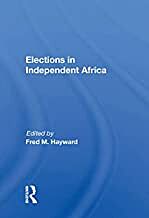Local Storage seems to be disabled in your browser.
For the best experience on our site, be sure to turn on Local Storage in your browser.
The electoral process has been an integral part of the political landscape of independent Africa for more than a quarter-century and has roots going back to traditional African societies. An examination of the independence period demonstrates the rich diversity of forms, experiences, and meanings of elections in Africa. For some observers, elections are a clear example of multiple failures in Africa-the failure of democracy and institutional transfer and the breakdown of much of the African political process in general. The authors of this book argue that elections in Africa have played a much more significant role than has commonly been recognized; that in spite of problems, elections are an important part of African contemporary political life. It has been too easy to dismiss elections in Africa as irrelevant because there are fewer today than there were two decades ago or because they have frequently failed to conform to democratic norms. However, in a period in which the primary trends of government are toward exclusion, African elections provide one of the few instruments of political action open to civil society. This study of the electoral process suggests a number of themes and conclusions about the relationship of the electoral process to state power and institutions, elite competition, mass participation, legitimacy and its limits, ethnic conflict, mobilization, party competition, authoritarian regimes, the growing incidence of electoral violence, and mass support for democratic values. Fred M. Hayward's substantive introduction discusses the electoral process in general. Eight case studies of key African countries then illustrate the varied meanings and implications of elections in independent Africa, and in the final chapter Hayward draws conclusions about the role and impact of elections. It is clear that although electoral processes have demonstrated a certain fragility, both the form and the process have shown remarkable resilience.
| Author | Fred M. Hayward |
|---|












Sign In
Create New Account